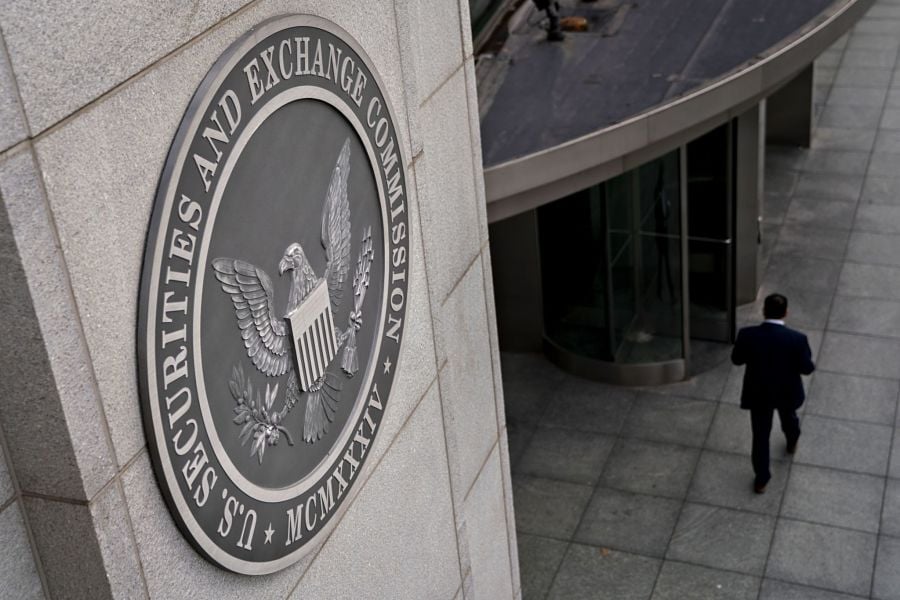

An SEC enforcement action against Titan Global Capital Management USA highlights the dangers investment advisors face when using hypothetical returns in their advertising, compliance experts said Monday.
The Securities and Exchange Commission ordered robo-advisor Titan to pay $1,042,454 to settle charges that it violated the agency’s marketing rule when it advertised sky-high performance results for its “Titan Crypto” investment strategy. The SEC alleged that between Aug. 11, 2021, and Oct. 3, 2022, Titan touted annualized returns of 2,700% without providing any supporting context in its advertising, according to Monday's SEC order.
For instance, the firm did not mention that the return was based on a “purely hypothetical account” rather than an actual account and that the promised return was based on the assumption that the “strategy’s performance in its first three weeks would continue for an entire year,” the SEC order states. “Titan also failed to provide information in its advertisements about the risks and limitations of using this hypothetical performance in making investment decisions.”
The SEC said the case is its first enforcement action based on the new marketing rule that went into force last November. That regulation overhauled how advisors can promote their firms for the first time since 1961. Major provisions include permitting client testimonials and allowing the use of past performance metrics with many related restrictions.
Titan agreed to comply with the marking rule beginning in June 2021 — well before the compliance deadline in November 2022 but after the rule went into effect in May 2021. In addition to its violations regarding hypothetical advertising, the SEC charged Titan with failing to adopt policies and procedures meant to ensure compliance with the marketing rule.
“When offering and marketing complex strategies, investment advisers must ensure the accuracy of disclosures made to existing and prospective investors,” Osman Nawaz, chief of SEC enforcement’s complex financial instruments unit, said in a statement. “The Commission amended the marketing rule to allow for the use of hypothetical performance metrics but only if advisers comply with requirements reasonably designed to prevent fraud. Titan’s advertisements and disclosures painted a misleading picture of certain of its strategies for investors. This action serves as a warning for all advisers to ensure compliance.”
The SEC ordered Titan to pay $192,454 in disgorgement, prejudgment interest and an $850,000 civil fine. Titan did not admit nor deny the SEC’s findings. The SEC said the firm cooperated in the investigation. A lawyer for Titan did not immediately respond to an interview request.
Titan’s lack of transparency in promoting its crypto strategy would have gotten it in trouble under either the previous marketing rule or the new one, said Amy Lynch, president of FrontLine Compliance.
“The allegations are so egregious, they likely would have been charged either way,” Lynch said. “The anti-fraud provisions applied no matter what.”
But the action provides another example of what the SEC is expecting in terms of compliance with the new marketing rule. Previously, the agency had issued written guidance and made statements at industry conferences.
Investment advisors who use hypothetical performance in their advertising should review their policies and procedures and their disclosures.
“They need to make sure the limitations of the information are well represented,” Lynch said.
Most advisors looking at the Titan case would agree that the firm made major missteps in using projected performance, said Chuck Martin, chief operating officer at Vigilant, a compliance consulting firm.
But that doesn’t mean they shouldn’t take lessons from the SEC’s action. For instance, advisors should be ready to justify the claims they make to attract investors.
“This further emphasizes to firms that are advertising hypothetical performance to the retail public the importance of providing proper disclosures,” Martin said.
Although the SEC zeroed in Titan’s use of hypotheticals, the agency has made clear that it’s taking a broad approach to examinations regarding the marketing rule. The regulation contains several prohibitions to prevent untrue, unsubstantiated or misleading statements in messages advisors disseminate on TV, radio, websites and social media.
“When [the SEC] comes into your shop, they’re looking at every aspect of the marketing rule, not just what they published” in guidance, Lynch said.
The case against Titan touched on other hot-button issues for the SEC. For instance, the agency also charged it with making “conflicting disclosures” about how it custodied client funds; failing to adopt policies and procedures regarding crypto trading by its employees; and violations regarding its use of “hedge clauses.”
“This is the perfect [compliance] cocktail,” Martin said. “There are a lot of issues here.”

It's the mega-RIA firm's third $1B+ acquisition in just three months.

Wall Street leaders propose ways to monetize the mortgage giants.

Changes in legislation or additional laws historically have created opportunities for the alternative investment marketplace to expand.

A Texas-based bank selects Raymond James for a $605 million program, while an OSJ with Osaic lures a storied institution in Ohio from LPL.

The Treasury Secretary's suggestion that Trump Savings Accounts could be used as a "backdoor" drew sharp criticisms from AARP and Democratic lawmakers.
Orion's Tom Wilson on delivering coordinated, high-touch service in a world where returns alone no longer set you apart.
Barely a decade old, registered index-linked annuities have quickly surged in popularity, thanks to their unique blend of protection and growth potential—an appealing option for investors looking to chart a steadier course through today's choppy market waters, says Myles Lambert, Brighthouse Financial.
